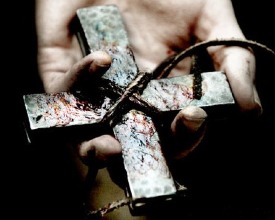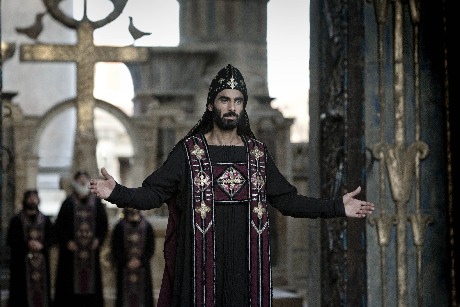Check out Alejandro Amenábar’s Agora starring Rachel Weisz. It is a film that dramatises how the early Christian movement morphed from a small annoyance in Alexandria in then Roman-ruled Egypt in the 4th century into a massive lynch mob powerful and violent enough to bully the Roman provincial government into tolerating their own intolerance for “infidels”. A peaceful coexistence with the Roman prefect in the city did not stop Christian zealots from burning down the fabled Library of Alexandria and destroying much of the ancient world’s record of knowledge.

Agora was screened out of competition at the 2009 Cannes Film Festival in May, and opened in Spain on October 9, 2009 becoming the highest grossing film of the year for that country. Although the film had difficulty finding distribution, it was released country by country throughout late 2009 and early 2010.
| SUPPORT INDEPENDENT SOCIAL COMMENTARY! Subscribe to our Substack community GRP Insider to receive by email our in-depth free weekly newsletter. Opt into a paid subscription and you'll get premium insider briefs and insights from us. Subscribe to our Substack newsletter, GRP Insider! Learn more |
Allusions to the behaviour of modern-day Taliban liberally pepper the film in the way it portrays the ignorance of early Christian converts and how their charismatic leaders and clerics exploited this ignorance to incite bloodlust in mobs of these converts to carry out their own political agendas and murder political opponents. A key theme of the film is the arbitrary manner with which clerics interpret scripture to make their edicts orbit above the reach of critical evaluation render them immune to negotiation.

It is a must-see for those who are deeply disturbed by the coercive tactics seemingly being used by the Philippines’ Catholic Bishops Conference of the Philippines (CBCP) and religious leaders like Pro-Life Philippines leader Eric Manalang to further divisiveness in Philippine society under the premise of their interpretation of what is “moral” and “righteousâ€.
A large part of the Church’s efforts in the last several centuries has been focused on cultivating this control mechanism in our hearts across generations and centuries. More importantly, that same effort entailed the suppression of our natural thirst for knowledge rather than encouraging us to seek fundamental truths. The methods used to establish this domination ranged from the sublime — fear of excommunication — to administrative — censorship (one would be surprised to learn the amount of censorship and editing the Bible itself had undergone over the last millenium) and witholding of “heretical” information from ordinary Christians — to extremist — the Crusades and the Inquisition.
We should be reminded that the whole foundation of our religious beliefs whether we are Christian or Muslim is based on texts and teachings of human spiritual leaders and teachers. We as a people still have a long way to go in the direction of re-focusing on the spiritual aspect of our faith rather than its canonical, catechetical, or, at worst, political aspects.
The masterful production of Agora provides as close an experience as its audience may ever get of the profound injustice in a society engulfed by religious zealotry.
[Parts of this article were lifted from the article Agora (film) in a manner compliant to the Creative Commons Attribution-ShareAlike License that governs use of Wikipedia.org content.]
benign0 is the Webmaster of GetRealPhilippines.com.
That’s why the Bible instructed its followers to test everything…even if an angel or anything preach a gospel that is not according to the teachings of the LORD…let them be damned…I’ve read the whole Bible 2 times already…and its saddening that many so-called “Christians” doesn’t even know the Bible or the true teaching of what is Christianity…they are stuck to listening only without testing if what they are listening into is according to the WORD…the LORD correctly says it…”WHEN I COME BACK, WILL I FIND FAITH?”…
Spot on bro… Its not actually Christianity that is predominant in the Philippines, it is CATHOLICISM… AND HECK IT AIN’T CHRISTIANITY…
I doubt if they will allow this to be shown here… If they do manage to sneak it in… The theater owners would eventually shut it down due to threats against property and people made by these religious zealots!
There’s always the pirated DVD. 🙂
“…did not stop Christian zealots from burning down the fabled Library of Alexandria and destroying much of the ancient world’s record of knowledge.”
Huh, kind of relieved to read this, as Muslims have been wrongly accused of being the ones burning the Library of Alexandria.
BTW, the film, I believe, is purely fictional. You might also want to read this… http://en.wikipedia.org/wiki/Library_of_alexandria …
“The” Royal Library of Alexandria was probably destroyed by Julius Caesar; at any rate, if you read the works of the Roman historian Strabo, we can infer that it was gone sometime before 20 BC.
However, Alexandria was a center of scholarship for centuries, and there was not only one library in Alexandria. Strabo refers to a library — or more specifically, a collection of learned writings — that his sources had access to that he did not. They may have been housed in the Serapeum, which may have been destroyed during Theophilus’ time (because he was actually a douche), or it may have been a little earlier. No one is really certain, and Gibbon’s account, on which much of the history of this film appears to be loosely based, is suspect. It doesn’t help that the part of Alexandria where all this fun stuff once stood is now underwater, and probably beyond the ken of men.
The protagonist of the movie is the philosopher Hypatia (played by the lovely Rachel Weisz) who, according to Wikipedia was born c.350-370 AD. Also according to that account she was “killed by a Christian mob”, so that much we know (if we are to believe Wikpiedia).
That almost sounds like something Catholic mobs in the Philippines would do to Mideo Cruz if left entirely to their devices today.
I have seen the whole movie already. I doubt it would be shown here in our country, judging from how they reacted to Mideo Cruz’ art exhibit in CCP.
I thought Inquisition burned the Royal Library of Alexandria?
I think the Inquisition happened much later during the Medieval periods. The setting of this film is classical/ancient times it seems.